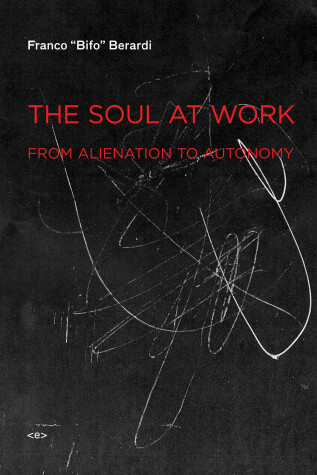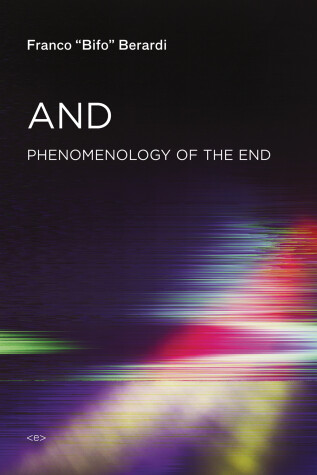Semiotext(e) / Foreign Agents
2 total works
We can reach every point in the world but, more importantly, we can be reached from any point in the world. Privacy and its possibilities are abolished. Attention is under siege everywhere. Not silence but uninterrupted noise, not the red desert, but a cognitive space overcharged with nervous incentives to act: this is the alienation of our times...
—from The Soul at Work
Capital has managed to overcome the dualism of body and soul by establishing a workforce in which everything we mean by the Soul—language, creativity, affects—is mobilized for its own benefit. Industrial production put to work bodies, muscles, and arms. Now, in the sphere of digital technology and cyberculture, exploitation involves the mind, language, and emotions in order to generate value—while our bodies disappear in front of our computer screens.
In this, his newest book, Franco “Bifo” Berardi—key member of the Italian Autonomist movement and a close associate of Félix Guattari—addresses these new forms of estrangement. In the philosophical landscape of the 1960s and 1970s, the Hegelian concept of alienation was used to define the harnessing of subjectivity. The estrangement of workers from their labor, the feeling of alienation they experienced, and their refusal to submit to it became the bases for a human community that remained autonomous from capital. But today a new condition of alienation has taken root in which workers commonly and voluntarily work overtime, the population is tethered to cell phones and Blackberries, debt has become a postmodern form of slavery, and antidepressants are commonly used to meet the unending pressure of production. As a result, the conditions for community have run aground and new philosophical categories are needed. The Soul at Work is a clarion call for a new collective effort to reclaim happiness.
The Soul at Work is Bifo's long overdue introduction to English-speaking readers. This Semiotext(e) edition is also the book's first appearance in any language.
Franco “Bifo” Berardi's newest book analyzes the contemporary changes taking place in our aesthetic and emotional sensibility—changes the author claims are the result of semio-capitalism's capturing of the inner resources of the subjective process: our experience of time, our sensibility, the way we relate to each other, and our ability to imagine a future. Precarization and fractalization of labor have provoked a deep mutation in the psychosphere, and this can be seen in the rise of psychopathologies such as post-traumatic stress disorder, autism, panic, and attention deficit disorder. Sketching out an aesthetic genealogy of capitalist globalization, Berardi shows how we have arrived at a point of such complexity in the semiotic flows of capital that we can no longer process its excessive currents of information. A swarm effect now rules: it has become impossible to say “no.” Social behavior is trapped in inescapable patterns of interaction coded by techno-linguistic machines, smartphones, screens of every size, and all of these sensory and emotional devices end up destroying our organism's sensibility by submitting it to the stress of competition and acceleration.
Arguing for disentanglement rather than resistance, Berardi concludes by evoking the myth of La Malinche, the daughter of a noble Aztec family. It is a tale of a translator and traitor who betrayed her own people, yet what the myth portends is the rebirth of the world from the collapse of the old.

